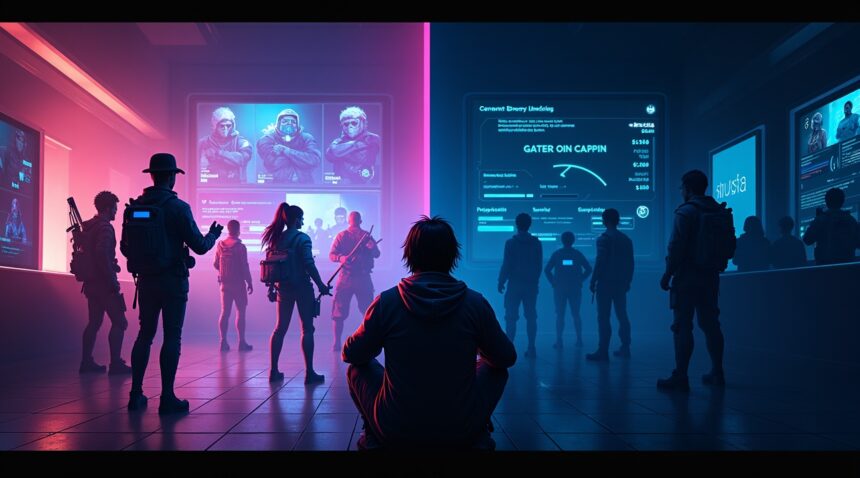Ubisoft Defends Microtransactions as Essential Revenue Stream in 2024–2025 Report
Ubisoft defended its microtransaction practices in its 2024–2025 annual financial report, asserting these optional purchases enhance player enjoyment through avatar customization and quicker progression in premium games.
The gaming giant’s stance coincides with digital microtransactions now generating 58% of its PC revenue. This makes these often-criticized monetization approaches financially vital, even amid persistent backlash from the gaming community.
Key Takeaways
- Microtransactions generate 58% of Ubisoft’s PC revenue for 2024, underscoring their financial necessity in the publisher’s business framework.
- Ubisoft upholds a “golden rule” that ensures complete game experiences are possible without making additional purchases, framing microtransactions as optional.
- The gaming community rejects these justifications as disingenuous, suggesting developers create artificial barriers to encourage more spending.
- Ubisoft’s microtransactions include both cosmetic and gameplay options, such as character skins and XP boosters.
- Reception varies between game types — free-to-play titles tend to gain more tolerance for these systems, while premium-priced games face sharp criticism.
Ubisoft’s Defense: Convenience and Choice
The French publisher justified their revenue model by emphasizing the role of player choice and convenience. According to Ubisoft executives, microtransactions are designed to offer players options, rather than act as a compulsory path to enjoying content fully.
However, the financial dependency revealed in their earnings shows how significant these systems have become. Digital extras, such as in-game currency and power-ups, now outpace traditional game sales in PC earnings. This marks a notable shift in how developers think about game design, player motivation, and post-launch monetization.
Player Frustration and Community Backlash
Widespread criticism continues to target microtransactions in full-priced games. Many players see these mechanics as a double-dip strategy, forcing consumers to pay upfront and again if they want to avoid tedious game progression. Critics argue that these systems often slow progress or lock desirable features behind paywalls, creating artificial friction that pressures spending.
Despite these sentiments, Ubisoft insists that players can enjoy a “complete experience” without engaging in monetization. The publisher maintains that alternative payment options only offer time-savers or personalization and don’t diminish core gameplay. Still, some question whether the internal balance of these systems truly remains unaffected when so much revenue relies on purchases beyond the base game.
Free-to-Play vs. Premium Games: A Monetization Divide
Players typically display more acceptance toward microtransactions in free-to-play models. Because there’s no baseline cost, transactions in these titles feel less intrusive or unjustified. Conversely, players purchasing premium titles expect full, unrestricted access to the game — making additional monetization feel exploitative to many.
This disparity in reception highlights the evolving expectations consumers place on various pricing models. It also reflects a broader disconnect between what publishers offer and what players perceive as fair value.
A Larger Industry Debate
At its core, the controversy reflects deeper industry tensions between maximizing profitability and respecting player satisfaction. Large projects, live services, and ongoing content development require predictable income. Microtransactions provide that stream in ways traditional upfront sales often cannot replicate.
Yet, backlash remains strong. Players speak out across forums and social media, and some turn away from games perceived as disrespectful to their time or wallets. This discontent signals a growing demand for transparency, ethical design, and better consumer treatment in AAA gaming.
The Road Ahead: Awareness and Accountability
With player trust eroding, consumer education becomes a vital defense. Gamers who recognize the use of psychological triggers, time gating, and artificial grinding mechanisms can better protect themselves from unwanted spending. These skills also empower players to support titles that align with their values and purchase preferences.
The monetization debate also touches on wider conversations about game ownership. Modern titles increasingly resemble subscriptions or services, where access and perks come at ongoing or optional cost. This fundamentally changes our understanding of what a “complete” game entails.
The Future: Regulation and Consumer Power
How this trend evolves depends largely on market forces and regulatory developments. Some governments have started restricting predatory monetization systems, especially loot boxes, which some policymakers compare to gambling. If such legislation increases, studios may have to rethink their strategies entirely.
Ultimately, players influence industry direction the most through their purchasing decisions. Whether choosing to support or boycott certain practices, the collective response of the gaming community will determine which business models flourish in the years to come.
Ubisoft Claims Microtransactions “Make the Player Experience More Fun” by Enabling Avatar Personalization and Faster Progression
Ubisoft made bold statements in its 2024-2025 annual financial report, declaring that microtransactions enhance player enjoyment through avatar customization and accelerated progression. I find this positioning particularly interesting given the ongoing debate about monetization in premium games that players already purchase at full price.
The Financial Reality Behind the Claims
The numbers tell a compelling story about Ubisoft’s business strategy. Digital microtransactions generated 58% of the company’s PC revenue for fiscal year 2024, demonstrating their heavy dependence on this monetization model. This revenue stream has become essential for the publisher’s financial health, which explains their public defense of these practices.
Ubisoft frames its approach around what they call their “golden rule” — ensuring players can enjoy complete game experiences without mandatory additional purchases. They consistently emphasize that all microtransactions remain optional, positioning them as convenience features rather than necessities. The company argues these options provide value by allowing players to personalize their avatars or bypass time-consuming progression systems.
The publisher’s messaging targets two distinct audiences:
- Investors who want to see sustainable revenue streams
- Gaming communities who’ve expressed frustration with aggressive monetization
By promoting microtransaction models as player-friendly enhancements, Ubisoft attempts to justify practices that generate substantial ongoing revenue.
However, this stance raises questions about game design philosophy. When companies profit significantly from progression shortcuts, they face inherent pressure to create systems that naturally encourage those purchases. The balance between optional convenience and designed friction becomes crucial for maintaining player trust.
Ubisoft’s approach contrasts with other publishers who’ve faced backlash for aggressive monetization. The company’s emphasis on “fun” and “personalization” represents a marketing strategy designed to reframe potentially controversial practices in positive terms. Their focus on long-term sustainability suggests they view microtransactions as fundamental to modern game development economics.
The gaming industry continues evolving its monetization strategies, with companies like Ubisoft leading conversations about acceptable practices. While some players appreciate customization options and progression shortcuts, others prefer traditional models where full-price purchases include complete experiences. This debate particularly affects franchises like Assassin’s Creed, where microtransactions have become standard features across multiple releases.
I observe that Ubisoft’s public statements serve dual purposes: reassuring investors about revenue stability while attempting to maintain positive relationships with gaming communities who ultimately determine long-term franchise success.

Gaming Community Erupts Over “Tone-Deaf” Justification for Premium Game Monetization
The gaming community’s response to Ubisoft’s stance has been overwhelmingly negative, with fierce criticism erupting across multiple platforms. Reddit threads, X (formerly Twitter) posts, and gaming forums have become battlegrounds where players express their frustration with what they perceive as corporate greed disguised as player benefit.
Players Reject Profit-Driven “Fun” Claims
Gamers aren’t buying Ubisoft’s explanation that microtransactions enhance enjoyment. Instead, they’ve characterized the company’s justification as fundamentally “tone-deaf” and transparently motivated by profit margins rather than genuine concern for player satisfaction. Critics consistently point out that these monetization strategies often create artificial barriers within games specifically designed to frustrate players into spending additional money.
The community’s anger stems from a perceived manipulation of game design principles. Players argue that developers deliberately implement grind-heavy mechanics and slow progression systems, then offer paid shortcuts as “convenient” solutions. This practice strikes many as fundamentally dishonest, especially when it occurs in premium titles that already cost $60-$80 upfront.
Premium Games Face Harsher Scrutiny
A clear distinction emerges in how players view microtransactions across different game models. Many gamers express greater tolerance for cosmetic purchases in free-to-play games, recognizing these as legitimate revenue streams for titles they haven’t paid to access initially. However, this acceptance evaporates when similar systems appear in full-priced games.
Players frequently cite specific examples like Assassin’s Creed Odyssey, where they claim normal progression was deliberately slowed to encourage purchases of experience boosters and time-saving items. This practice has led many to describe such monetization as “borderline daylight robbery” — paying extra for content that’s already included in a premium-priced game.
The controversy extends beyond individual titles, with players expressing concern about industry-wide trends. Diablo 4’s microtransaction controversy demonstrates how even established franchises face backlash when implementing aggressive monetization in full-priced releases. This pattern suggests that player resistance to premium game monetization continues to grow stronger across different publishers and franchises.
Community sentiment indicates that trust between players and major publishers like Ubisoft has eroded significantly, with many viewing corporate statements about “enhanced player experience” as marketing rhetoric rather than genuine design philosophy.

Cosmetic Skins to XP Boosters: Breaking Down Ubisoft’s Microtransaction Categories
Ubisoft’s microtransaction strategy spans two distinct categories that have become standard across their flagship franchises. I’ve observed how these monetization methods have evolved throughout recent Assassin’s Creed titles, from Origins through Valhalla and into the upcoming Shadows release.
Cosmetic Customization Options
Cosmetic microtransactions represent the less controversial side of Ubisoft’s monetization approach. These purchases include character skins, unique outfits, special mounts, and avatar customizations that don’t affect core gameplay mechanics. Players can express their personal style through these visual enhancements without gaining any competitive advantage or gameplay benefits.
The appeal lies in personalization – allowing players to stand out in multiplayer environments or simply enjoy a fresh aesthetic during their single-player journey. I find that cosmetic purchases work particularly well in games with strong visual identity, where players develop emotional connections to their characters’ appearance.
Progression-Based Purchases
Progression-based microtransactions take a more direct approach to gameplay modification. XP boosters, priced around $5, fundamentally alter the game’s leveling pace by reducing the time investment required for character advancement. These purchases allow players to match what developers consider normal progression without additional grinding.
Time-skip purchases and convenience options extend beyond simple XP boosts. Map packs reveal treasure chest locations, while hint systems guide players to hidden content they might otherwise spend hours searching for. Ubisoft markets these as quality-of-life improvements for time-conscious players who want to experience content without investing extensive exploration time.
Player Reception and Industry Ethics
The distinction between these categories becomes crucial when considering player reception. Cosmetic microtransactions generally receive acceptance in free-to-play games, where they support ongoing development costs. However, criticism intensifies when these same systems appear in premium-priced titles where players have already made a significant upfront investment.
This controversy mirrors broader industry debates about monetization ethics. Microtransaction controversies often center on whether publishers are creating artificial problems to sell solutions, particularly with progression boosters that address grinding mechanics the developers themselves implemented.
Multimillion-Dollar Business Model Behind the Controversial Claims
The financial reality driving Ubisoft’s stance becomes crystal clear when examining their revenue streams. A staggering 58% of Ubisoft’s PC revenue came from microtransactions in 2024, a figure that reveals why the publisher maintains such a strong defense of these controversial mechanics. This massive portion of their income stream transforms what players see as optional purchases into fundamental pillars supporting the company’s entire business structure.
Revenue Dependency Shapes Corporate Strategy
Ubisoft’s investor communications consistently frame optional paid items as essential components of their long-term sustainable business model. I find this messaging particularly telling because it highlights how these transactions function less as player enhancements and more as critical revenue generators. The company positions microtransactions as necessary elements for maintaining ongoing game development and content creation, essentially arguing that player purchases today fund tomorrow’s gaming experiences.
This revenue dependency creates a compelling business case that extends far beyond immediate profit margins. When more than half of platform-specific revenue stems from post-purchase spending, defending microtransactions becomes a matter of corporate survival rather than simple player satisfaction. The financial imperative explains why Ubisoft executives continue championing these systems despite facing significant player backlash across multiple game releases.
Industry Context and Competitive Positioning
The broader gaming industry landscape reveals that Ubisoft isn’t operating in isolation. Microtransactions have become standard practice among leading publishers, particularly those focusing on shooter and sports titles where competitive advantages and cosmetic customization drive purchasing decisions. However, Ubisoft’s implementation differs significantly from typical industry approaches.
While competitors primarily integrate these systems into free-to-play games or multiplayer-focused experiences, Ubisoft aggressively implements them within premium story-driven games. This strategy proves particularly controversial because players already pay full retail prices for these experiences. Diablo 4’s microtransaction controversial reception demonstrates how even successful franchises face scrutiny when combining high upfront costs with ongoing monetization schemes.
Recent developments suggest Ubisoft continues expanding this approach across their portfolio. Upcoming Assassin’s Creed game preparations indicate continued integration of these systems, while the company diversifies into other revenue streams like Assassin’s Creed branded drinks. Even rumors about Ubisoft’s rumored Blade game suggest these monetization strategies will extend into new intellectual properties.
The company’s defense strategy targets two distinct audiences simultaneously. Public statements emphasize player experience improvements and enhanced engagement, while investor communications focus heavily on sustainability metrics and long-term revenue projections. This dual messaging approach reveals the tension between maintaining player goodwill and satisfying shareholder expectations.
Corporate executives consistently frame microtransactions as tools for extending game lifespans and supporting ongoing content development. They argue that optional purchases enable continued investment in post-launch support, additional content creation, and improved server infrastructure. From a business perspective, this model provides predictable revenue streams that traditional one-time purchases cannot match.
The financial success of this approach validates Ubisoft’s strategy from an investor standpoint. When microtransactions generate such substantial revenue percentages, abandoning or significantly reducing these systems would require finding alternative revenue sources worth hundreds of millions annually. This economic reality explains why company leadership remains committed to defending and expanding these practices despite ongoing player criticism and industry debate about ethical monetization in premium games.

Sources:
Notebookcheck – “Ubisoft claims microtransactions make the player experience more fun in annual report”
GosuGamers – “Ubisoft claims microtransactions make games more fun in annual report”
HotHardware – “Ubisoft Boldly Claims Microtransactions Make Games More Fun”
GameRant – “Ubisoft Says Microtransactions Make Player Experience More Fun”
Luke Stephens (YouTube)

